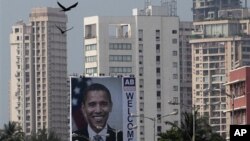President Barack Obama arrives in India later Saturday for a three day visit aimed at deepening economic, trade and security ties between the two countries. The president wants to open Indian markets to American businesses in order to help create jobs in the United States.
The president arrives in Mumbai at the peak of the Diwali celebration.
On the night before his arrival, fireworks boomed throughout the city, though they were banned in the area where Mr. Obama is staying.
Indian authorities and U.S. personnel made final security preparations for the president's arrival. This was the description in a report on the Indian Headline TV news channel.
"The American president is the most protected man on the planet, even when he is gallivanting halfway across the globe. Everywhere the U.S. president a whole paraphernalia of aircraft, security personnel and high-tech equipment go with him. Both Mumbai and Delhi where President Obama will be dividing his time in India have been converted into virtual fortresses," read the news anchor.
President Obama and his wife Michelle will be staying at the Taj Hotel, one of the targets of terrorist attacks against the city on November 26, 2008 which killed some 160 people, and left more than 300 wounded.
He will view a memorial there to the victims of the attacks, and make remarks before visiting the Gandhi Museum in Mumbai.
But the main event on Saturday is Mr. Obama's participation in a roundtable of U.S. and Indian business executives, and remarks he will make to a business summit organized by the U.S - India Business Council.
Two-way India-U.S. trade is now at $50 billion a year. President Obama spoke before leaving Washington about the key aim of his visit to India. "I'm going to be talking about opening up additional markets in places like India so that American businesses can sell more products abroad, in order to create more jobs here at home," he said.
Ron Somers, who heads the U.S. - India Business Council and is here in Mumbai, says U.S. - India trade is still only one tenth of U.S. trade with China. "U.S. - China trade is $500 billion, so we still have a long way to go. India is a free market democracy, they opened up much later than China, China opened in 1978, India opened in 1991, so the ride has just begun and it's going to be a thrilling experience for both countries," he said.
Mr. Obama may be able to announce new commercial deals during his stay in Mumbai. U.S. companies have been hoping to supply India with new jet fighter aircraft and engines. Another possible deal involves a purchase of Boeing military C-17 transport aircraft.
India would wants the U.S. to ease export controls and so-called dual-use licensing policies. Both sides seek more cooperation in commercial space technology, as well as more two-way business on environmental technology.
Among areas of disagreement, Indian businesses were upset by tighter U.S. restrictions on visas for high-tech workers. Mr. Obama faces pressure at home on the issue of outsourcing of jobs overseas.
Also to be ironed out is final implementation of the U.S.-India civil nuclear agreement, with U.S. businesses upset with a liability law passed by India's parliament and the impact this could have on future two-way nuclear technology trade.
Counter-terrorism cooperation, which U.S. officials say has been excellent, will be a key aspect of Mr. Obama's discussions with Indian Prime Minister Manmohan Singh and others, along with enhancing strategic relations.
Talks are also likely to focus on the situation in Afghanistan, and new U.S. military aid to Pakistan, with the president trying to encourage India-Pakistan talks aimed at lessening their bilateral tensions.
Briefing reporters on Air Force One during a re-fueling stop in Germany, National Security Advisor Tom Donilon, called President Obama's visit a very significant step in U.S.-India relations, and described India as "a cornerstone relationship for the United States".
Mumbai Prepares for Obama Arrival
- By Dan Robinson





